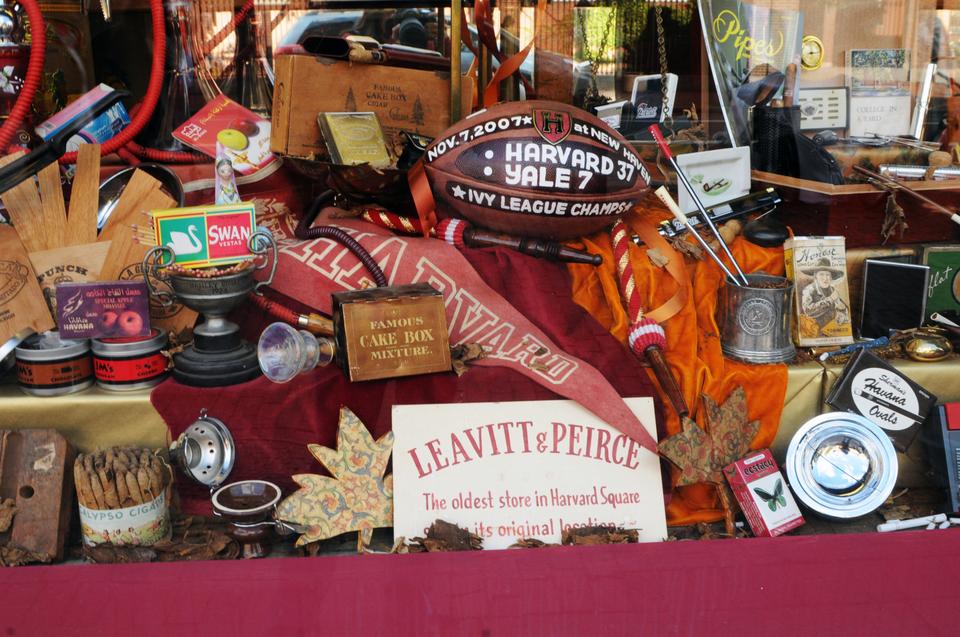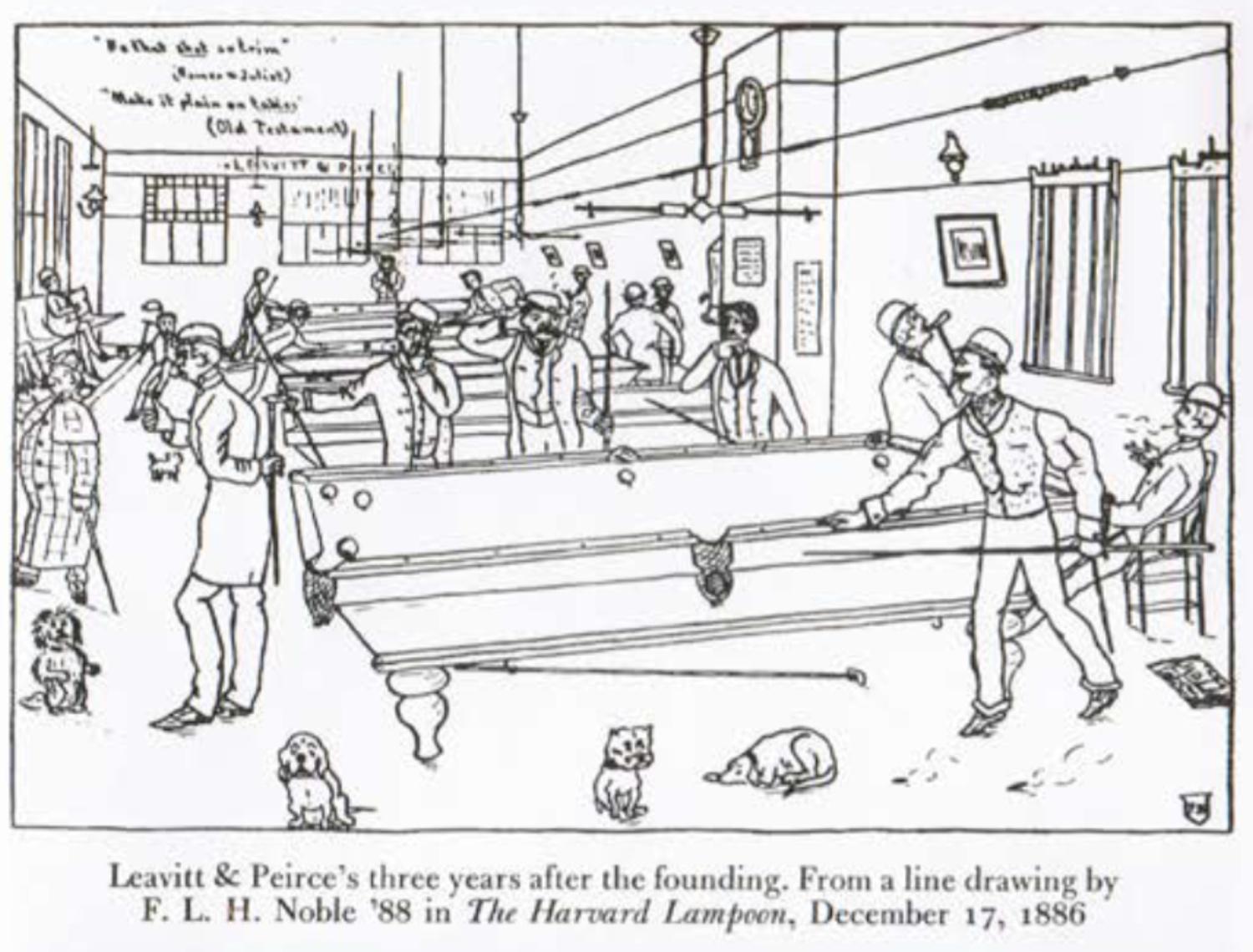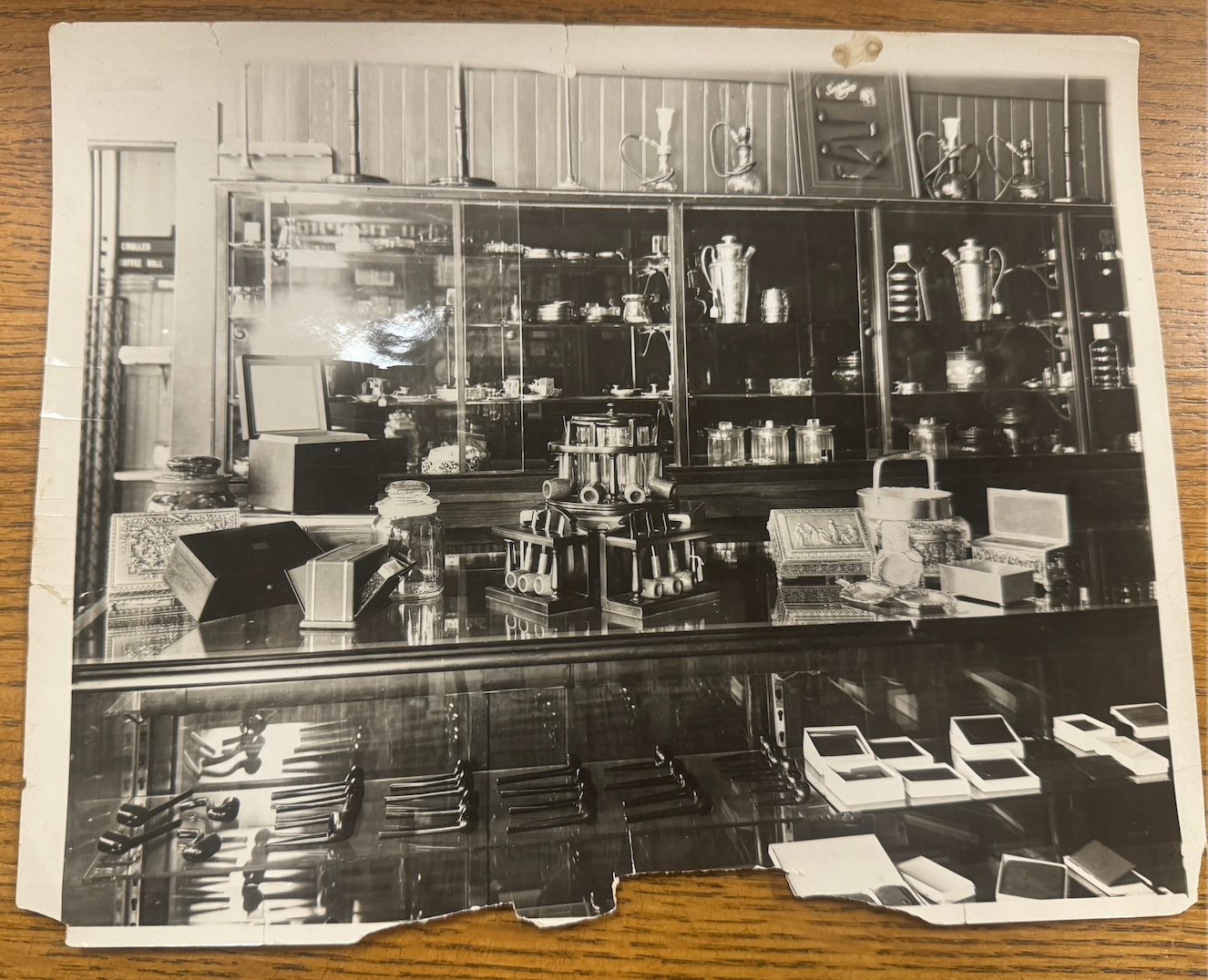
Peering Through the Smoke of Time at Leavitt & Peirce
Across the street from Wigglesworth, sandwiched between J.P. Licks and a t-shirt store, branded in a charming gold engraving that recalls a bygone era, sits Leavitt & Peirce.
As I walk into the store, a whiff of sweet and earthy pipe tobacco hits me.
I am not the only Harvard undergraduate to come nose to nose with the smell of pipe tobacco wafting from Leavitt & Peirce, which has been selling cologne, chess sets, and the gentleman’s indulgence since 1883.
But the original owners of the store, Fred H. Leavitt and Wallace W. Peirce, had engineered it to become a quasi-social club for Harvardians in the late 1800s and early 1900s. And a social club it did become.
In the back of the first floor, Leavitt and Peirce set up pool tables. On the second floor, they fashioned a billiards and chess parlor.
Those who could enter have fond recollections of aiming cues, sitting around with a pipe, and chatting. Women and freshmen were banned from the store.
It was “a den of sin” where “you just see clouds of smoke and guys playing billiards,” Paul J. Macdonald, the store’s current owner, told The Crimson in 2009.
Tomfoolery ensued amid such clouds of smoke. In a 1968 article entitled “Eighty-five Aromatic Years In Harvard Square,” historian Catharine K. Wilder recalls that Roger B. Merriman, Class of 1896, who would go on to become a well-respected Harvard professor and the first dean of Eliot House, once put a pool ball in his mouth and simply could not get it out. Merriman was soon fixed up, however, for “the Cambridge Police Department kept an object like a shoehorn handy for such emergencies.”
As I walk to the back of the store, there are no longer pool tables. Now, there is a walk-in humidor to preserve the tobacco. Only a small loft with three chess tables remains on the second floor. Macdonald tells me that Harvard, which owns the building that Leavitt & Peirce rents, took back the second floor to make offices in the mid-1900s.
You can still play chess there, for two bucks an hour — but no chess clocks allowed. In its heyday, Macdonald says, the chess clocks ringing and the clicking of the next turn were too loud for the store. It’s one of the best-kept secrets of Harvard Square.
Not only was the shop a social hub, it was also a hub for information.
The men’s crew team members would rush to the front window of the store at 9 a.m. to look at the practice roster and schedule for the day, “until e-mail ended that fine tradition (progress!),” Macdonald writes in a letter about the store on its website.
Until 1893, football game tickets were exclusively sold at Leavitt & Peirce. A 1922 Harvard Alumni Bulletin recalls, “Before the more important games a line of students waited outside the store all night until tickets went on sale, bringing chairs to sit and sleep in and lamps to read by.”
But at its core, Leavitt & Peirce was a purveyor of the scholar’s vice. After all, “what would scholarship be without tobacco?” Archibald T. Davison, Class of 1906, fondly recalled a faculty member remarking to him during a visit to the store, in “75 Aromatic Years of Leavitt & Peirce in the Recollection of 31 Harvard Men.”
Since 1883, generations of Harvard men and faculty have walked the floor of Leavitt & Peirce and dabbled with the tobacco that sits in shiny glass jars, its smell embedded through the store.
“My love life with Madame Nicotine began in my junior year at Harvard,” wrote William Bentinck-Smith ’37 in an ode to Leavitt & Peirce.
“Favorite for 75 years of all college men who smoked at Harvard University,” reads an advertisement for Leavitt & Peirce’s specialty Cake Box Mix, still a hallmark product of the store. According to a 1922 alumni bulletin, the Cake Box Mix was created by an old employee who mixed different types of tobacco in a cake box. When it was placed on sale, Harvardians were smitten. Graduates who had left Cambridge would demand that it be made available through mail order to be enjoyed from afar.
Leavitt & Peirce tobacco would enamor quite a number of Harvardians, each of whom would go on to make their own marks on the world.
The American painter Waldo Peirce, Class of 1908, recalls that it took him five years to graduate from Harvard thanks to Leavitt & Peirce. “It seemed more important at the time to make a run [to Leavitt & Pierce] often than to get a C plus or minus in, say, English A.”
Mark A. Dewolfe Howe, Class of 1887 and a 1925 Pulitzer Prize winner, penned an ode to Leavitt and Pierce, lauding the store for teaching “about a brand of special knowledge / Untaught within the larger college,” and pleading it to “Still teach your priceless brand of knowledge, / Proving all minor ills surmountable, / Teach on through years and years uncountable!”
The place was not only for the young men of Harvard, though. Macdonald recalls the regulars who would come and smoke. The owner of Ferranti-Dege, the camera store that once had been a couple steps from Leavitt & Pierce, would always take his lunch break in its smoking lounge. Faculty would go up for lunch, too. Wilder, the historian of the smoke shop, writes that “this ordinary luncheonette created the feeling of ‘an Elizabethan coffee house to so many people on the Harvard scene.’”
A symbol of a young man’s entry into adulthood, a place where flunksters and law school deans could equally enjoy its offerings, Leavitt & Peirce became a well-loved spot by many. The shop seems an ever present relic of the Harvard of yore, irremovable from its place on 1316 Mass. Ave. Lucius M. Beebe, Class of 1927, affectionately writes, “I hope the smoke of its burning may perfume Harvard Square forever.”
Today, it seems frequented less by students and more by tobacco aficionados and tourists. As pipe tobacco’s popularity waned compared to cigarettes, and as the store experienced changes in ownership and uncertain financing, the billiard and pool tables that had been loved for decades were put away for good.
Yet the residual sense of camaraderie and good time can be found in the writings about this store, in Macdonald’s recollections, and in every visitor to the shop. As I stood inside, I felt a strange sense of nostalgia, not for Leavitt & Peirce itself, but of common rooms, slices of Pinocchio’s Pizza, basketball games at Mather Courts, where even in my first few months of Harvard, I am reminded that good times are found in places that bring people together.





